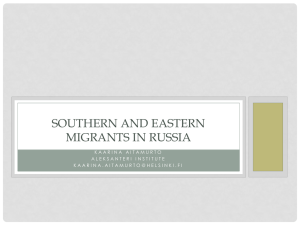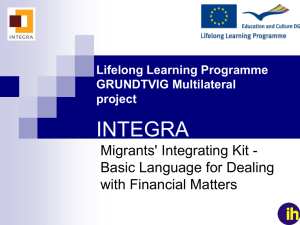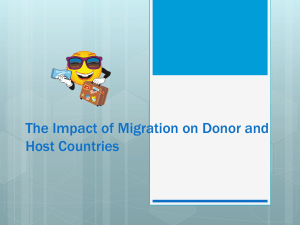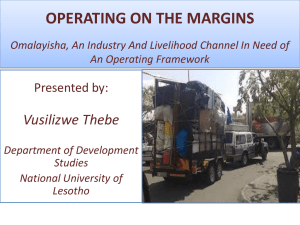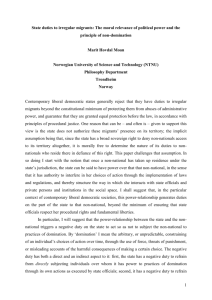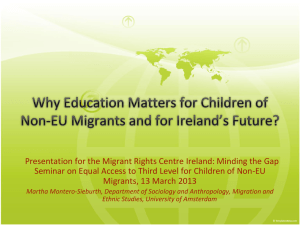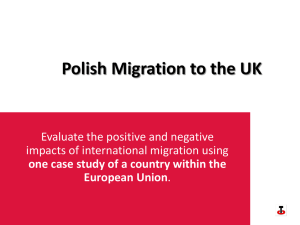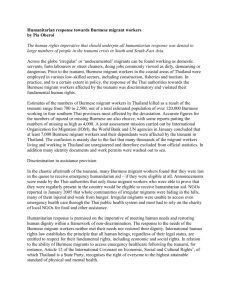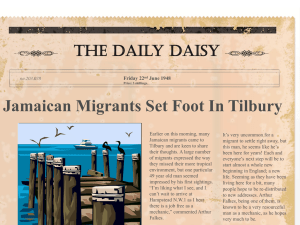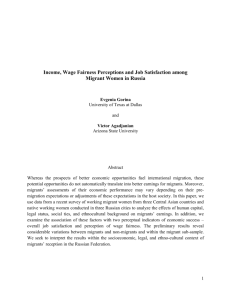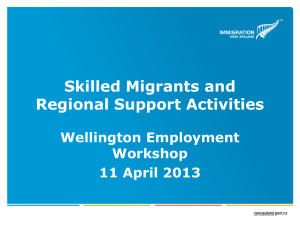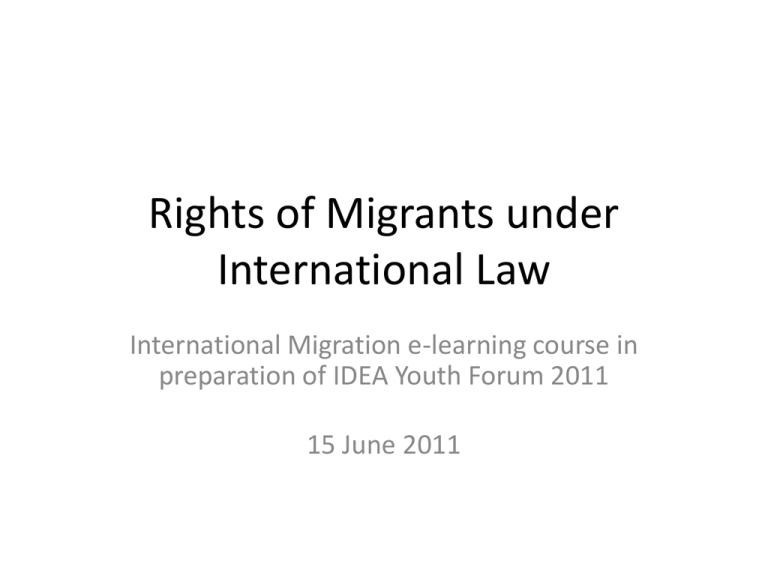
Rights of Migrants under
International Law
International Migration e-learning course in
preparation of IDEA Youth Forum 2011
15 June 2011
Learning Objectives
At the end of the presentation, participants
should have a clearer understanding of:
• The role of state sovereignty
• The contexts of the different legal regimes
• An overview of human rights norms
• The importance of the Intl. Convention of the
Rights of All Migrant Workers
Flow
First part:
• Introduction on migratory status vis-a-vis the
State
• The international legal regimes
• Question and answer session
Second part:
• International human rights principles & norms
• The Intl. Convention on Migrant Workers
• Question and answer session
First Part
Migration & State Sovereignty
• Question of legal jurisdiction: who is
responsible for a migrant’s rights?
– Territorial (origin, transit, receiving)
– Nationality
– Legal long-term residence
State Sovereignty on Borders
State right to control who enters its territory
• Exceptions:
– National law in accordance with international
obligations
• To return: may include long-term non-nationals
• Family reunification
– Regional accords:
• e.g. EU free movement (Schengen); ASEAN pact
– International state obligations
• Non-refoulement (refugees)
State Sovereignty in its Territory
State right to expel
• Limitations:
– National law in accordance with international
obligations
• To remain in the territory – for long-term non-national
residents according to requirements
• Family reunification
• Victims of trafficking
– Regional accords: e.g. EU law
– International state obligations
• Non-refoulement, regardless of migrant status
• Procedural safeguards for lawful residents & less for
irregular migrants
Source of State Responsibility
State Obligations under
International Law
Regional Law
National Law
3 Relevant International Regimes
International Human
Rights Law
International Labour
Law
Transnational Law
on Organised Crime
Question and Answer
Session for Part 1
Second
Part
International
Human
Rights Law
Everyone has human rights
ALL
Citizens
Non-nationals
Migrants (regular
& irregular)
ALL
• Principle of NonDiscrimination
• Principle of Equality
ALL
Principle of Non-Discrimination (ICCPR Art. 2(1))
•
•
•
•
•
to respect and ensure to all persons
within its territory and subject to its jurisdiction
human rights
without distinction of any kind,
such as race, colour, sex, language, religion,
political or other opinion, national or social
origin, property, birth or other status.
ALL
Principle of Equality (ICCPR Art. 26)
• to respect and ensure to all persons
• equality before the law
• as well as equal protection of the law
Basic, fundamental human rights
• Customary prohibitions: torture; slavery;
genocide
• Civil and political rights: life, liberty, speech,
expression, assembly, association, etc.
• Economic, social and cultural rights: health,
housing, food, water & sanitation, marriage,
cultural identity, etc.
• Rights of a “group”: children, gender, minority,
disabled, etc.
Are there limitations to these rights?
YES
(1) Legitimate
discrimination; or
(2) “Derogation”
NO
For non-derogable rights:
- Fundamental prohibitions
- Non-refoulement
- Life and Security (arbitrary
detention; mistreatment in
detention)
- Racial discrimination
- Freedom of thought & Religion
- Returning to one’s country
- Equality before the law
Differentiation between National &
Non-Nationals
Citizens
• Political
participation
rights
• Full ESC rights
Non-nationals
• No political
participation
rights
• ESC rights may
be limited
(CESCR art. 2(3)
Derogation
Acceptable Grounds for Derogation
• protection of national security or public order
or public health
• public emergency threatening the life of
nations/democratic societies
• Limitation of procedural grounds against
expulsion on national security grounds
Migrants
Regular Migrants
Irregular Migrants
- Residence and
employment rights
- Limited residence and
employment rights
- Freedom of movement
- No procedural rights
prior to expulsion except
for equality
- Procedural rights
Convention on the Rights of Migrant
Workers and Members of their
Families (CMW)
Non - universal
ratification!
“migrant worker”
• a person
• who is to be engaged, is
engaged or has been
engaged
• in a remunerated
activity
• in a State of which he or
she is not a national.
“members of the family”
• persons
• married to migrant
workers or
• Having a relationship that
produces effects
equivalent to marriage,
• their dependent children
and other dependent
persons
• recognized as members of
the family
CMW Coverage Exceptions
• Diplomats & international civil servants
(including official development workers)
• Investors;
• Refugees and stateless persons
• Students and trainees;
• Seafarers and workers on an offshore
installations
CMW Content • Part I – definition and scope
• Part II – the principle of non-discrimination
• Part III – human rights of ALL migrant workers
and their family members
• Part IV – other rights for migrants who are
documented or in a regular situation
• Part VI – promotion of equitable, humane and
lawful conditions, particularly for migrants in an
irregular situation
• Part VIII – general provisions on substantive
application of the Convention
What the
CMW does
NOT cover:
Migrants
Irregular Migrants
Regular Migrants
- Authorised to enter, to
stay and to engage in a
remunerated activity in
the State of employment
- Not authorised to enter,
to stay or to engage in a
remunerated activity in
the State of transit or
destination
CMW application to Irregular Migrants
(1)
Part III
Human rights of ALL migrant workers and their
family members
– All fundamental rights APPLY!
CMW application to Irregular Migrants
(2)
Part VI
• promotion of equitable, humane and lawful
conditions, particularly for migrants in an
irregular situation
– State obligation to consult /cooperate to ensure
labour migration takes place in humane and
sound conditions
– Provisions for sanctions against smugglers,
traffickers and employers
CMW application to Irregular Migrants
(3)
• Access to basic economic & social rights
• Safeguards in detention and expulsion
• Possibilities of regularisation and residence
rights

